This blog takes you to the depths of Jainism, what is it all about; what it philosophies... It tells you everything about it that I am acquainted with. Jainism has answers to every question, yes! This may not interest my friends but I will definitely be elated if it comes to use to any of my readers.
Wednesday, December 20
Are feelings/thoughts important?
Allow me illustrate you this with an example or two... Say, someone (mistakenly or intentionally) hits you or abuses you, you might not say anything to him/her ('samta') bt still you most probably will think evil for him, or just feel that you must take avenge it, or such things. This immediately gets your soul tied with more 'karmas'. This is a very small scale example. Consider this.. You worked all day hard on your assignment, and someone spilled water on it, or tore it, or misplaced it, or whatever. The instantaneous reaction is "idiot", "stupid", what did you do? and then you go on cursing the person. You should not even think about it.
Feelings should be correct not only towards other humans but animals too. You should not even think about killing or harming other living beings. Even thinking about gets you as much 'paap' as doing it. , such as... you might think on some occassion for whatever reasons you may have 'might god kill him' or 'may he be damned' snd such things. this is a very hideous crime according to Jainism. You are doing as much wrong as killing the person itself. that's why I said 'Feelings are damn important'. You must acknowledge this fact that you must prioritise 'good for all' before 'good for me'. And good thinking increases our good fortune.
here is a story... There was a king who strongly believed in 'ahimsa'. He was strictly against harming or killing others for his benefits. But due to some 'karmas' in his previous births, he was suffering from misfortune. He consulted his 'raajpandits' who were superstitious, and told the king to kill a hen to remove misfortune. he denied unthinkingly. But his mother begged her, and he couldn't deny her. That's why he thought of a way, he told his mother, that they could just make a statue of hen with flour ('aatta') and use it in yagya. Everyone agreed (or had to agree). BUT during the yagya, the king was thinking that they are giving a real hen as 'bali'. This thought, just this feeling, that he was killing a real hen resulted in his going to hell, and he got tied as much karma with his soul as it would have if it was really carried out.
So, you see?? Your thoughts are vital to your future and sometimes(most of the times) more important than your actions, since you think more than you do. So, what's the remedy if a hideous thought crosses our mind, and we cannot control it? Just be true to yourself and with real emotions and a real heart, ask for forgiveness for your soul, i.e. say 'tassa mischchami dukkadam'. (This is Jainism way of asking for forgiveness).
Therefore, I appeal to all my readers to groom their actions and thoughts as well, and always harbour good feelings towards others, whatever discomfort they give to you.
Tuesday, December 5
SAMTA- the ultimate feeling
'Samta' means the feeling of sambhaav, i.e. to harbour the same feeling for all and at all times, and that too not of hatred or love, well, actually, it is inexplicable as a feeling. You do not have to be happy when it is time to celebrate for that shows your 'moh' to worldly things; and at the same time you do not have to be sad and cry your heart out whenever life's not fair.
Samta includes not to be happy when it is time to be, just think why you are getting this happiness? because of your unearthly deeds in your previous births that you are born as a human this time; to not to be sad when you do not have the circumstances in accord to you; to not to be arrogant about what you have got, which is worth showing off in this world, be it money (like the rich look upon the poor), or status, or fair colour of skin, or may be some exceptionally good qualities (be it academic or otherwise)--remember friends, if you have some coveted quality, say intelligence, it is because of the very fact that you have done really good deeds in the past such as meditation on soul, and that's why you have that power of intelligence in you, don't waste away this quality and get the 'bandh' of more karmas by showing off or boasting or being arrogant about it, ; to bear any atrocities on you be it to any degree or extent-Bhagwaan mahavir swami didnt even say 'ouch' or even a small lineof worry cross his forehead when a gwala had knocked 2 screws into his 2 ears; and much more...
The tirthankaras had an unusual incredible samta.
'Samta' is aptly the ultimate feeling. If one keeps samta, (the feeling of 'sambhaav') in his life at every crossroad or so, he is bound to make his way to 'moksha' easier.
On this note, let me relate a story which is worthy of mention. There was a group of sadhu. On the day of samvasri (will be elaborated upon in later posts), when even common ppl keep a fast, one sadhu urged on not keeping it, since he did not feel he would be able to keep it. He went fro bhiksha to take food from the household. When he came back, he showed what he had brought to the acharya(every group has a head 'acharya') -it was 'khichdi'. The acharya was angry since on such an auspicious day, a sadhu of his group did not keep a fast. (anger is a feeling to be deserted). Anyways, so the acharya spat on the khichdi. Here consider yourself in the state of the sadhu, wouldnt you have been double angry and rebuked (and that's how wars or quarrels begin), but the sadhu, kept samta, that is, he felt no emotion at that point of time, not even for an instance, did anger cross his mind.
And this was the most unearthly thing of all... He instantly got the 'keval gyaan' (will be elaborated in next posta), and he went to moksha,the ultimate deestination for soul.
Note: a soul who gets kevala gyaan is destined to go to moksha.
so you see, how very important 'samta' is to cross this world of ups and downs, of good and bad, of love and treachery or enmity, to settle in the peaceful of all places in universe and beyond... moksha.
Saturday, November 18
The 'TIRTHANKARAS'
Jainism now acknowledges 24 gods or, better called tirthankaras
in the Namokar mahamantra, (1st post of October) we bow to the siddhas in the second line
Well, all the tirthankaras are siddha , though there are many more
Anyways, we had divided time into 2 parts- 'avasarpani' and 'utsarpani'
Every such part has 24 tirthankaras, i.e. there are 24 tirthankaras in every passage from 1st aara to the 6th or from the 6th to the 1st. These are the pure souls who were able to burn all their 'karmas' through samta, tap, jap, etc. And they now rest in 'moksha'.
So here are the 24 tirthankaras which were in this avasarpani kaal:
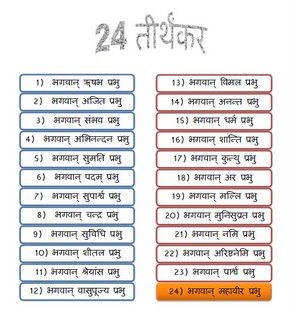
Note: at present the shasan of 24th tirthankar 'mahaavir' prabhu is going on, i.e. he was the last one.
So, we Jains worship them.
Tirthankaras are Jain gods. They when lived, lived ideally. They kept samta. They gave away worldly happiness (left the 'moh') and concentrated in their souls. They gave "gyaan" to all the common people about things not known to anyone. They had 'keval gyaan' i.e. they knew everything ('antaryami'). More will be elaborated upon the types of 'gyaan'. They were an epitome of kindness, benevolence, mercy. They never used to fight or even get angry, always looked to the other person's happiness, controlled their ambitions, lived a 'saadhu life'. They never took to live like a housefold. So they had to ask for food goin from home to home. Also they used to migrate from one place to another. They are the ideal persons in Jainism. Their 'vaani' used to have a deep effect on all people, and they always used to enourage others to take 'deeksha'.
Here's some interesting stuff. As you know, utsarpani kaal will follow the ongoing the avasarpani kaal. And we all know the great hindu god "Krishna". According to Jainism, he was a 'vasudeva' (more will be told afterwards), and his soul is in hell right now; our tirthankaras have predicted (they know everything, so, it's got to be true) that he will ve a 'tirthankara' in the next utsarpani kaal. Lucky soul, its getting moksha, the next time it comes to earth.
One piece of secret, My real name is the same as our third tirthankara, i.e. I am Sambhav Jain
Wednesday, November 15
TIME (classification)
here's yet another post...
According to Jainism or Jina Dharma, we classify time (kaal) into 2 parts:
1. avsarpani kaal, and
2. utsarpani kaal
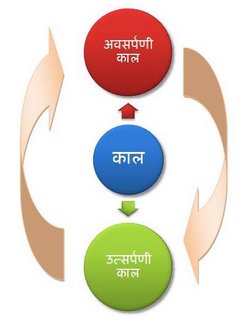
So, what happens is:
This world is beginning-less and endless, that is, it has no beginning and will have no end, more interesting posts on this topic will soon be coming
The 'avsarpani' and 'utsarpani' kaal alternate each other. So what are these are avsarpani and utsarpani?
So allow me to show you the detailed classification of time into what we call as 'aare':
1. Sukhad-sukhad (or Sukhma-sukhma) : This is the best. Noone has no worry, never. Everyone who is born in this time is happy, and why not we have the "kalpavriksha" and the "kamadhenu", who fulfill all wishes of all. (Yes! they are a reality)
2. Sukhad (or Sukhma): This is the second best. Almost similar to the first; everyone is happy here too, though not as much as 1st
3. Sukhad-dukhad (or Sukhma-dukhma): You get the sequence, don't you? So this comes next
4. Dukhad-sukhad (or Dukhma-sukhma): This is next
5. Dukhad (or Dukhma): No need to repeat same thing again and again. Here noone is happy, everyone has some worry or the other
6. Dukhad-dukhad (or Dukhma-dukhma): Worst; earth is burning, humans live beneath the earth, get out only at night and eat only non-veg. Vegetation disappears.
NOTE: the 'tirthankaras' only exist in 3rd and 4th aaras
So you might be wondering at present, which aara is going on?
Well, it is the 5th (Dukhad), this imply everyone has some worry or the other. Ask yourself, reader does no worry or anxiety trouble you; if your answer is 'NO', think again, for it is not possible.
And the time moves as follows: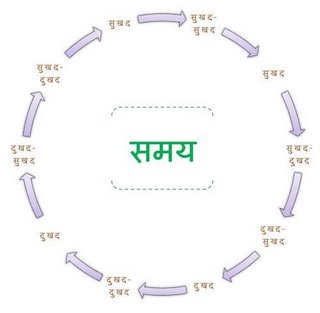
So, the the avsarpani kaal is this:
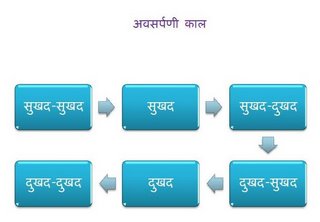
And the utsarpani kaal is this:
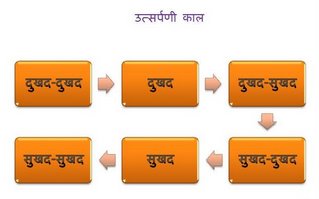
So you get the drift;
when time moves, it moves alternately as avsarpani-utsarpani-avsarpani-utsarpani----
Since the universe is beginning-less, noone can say which was the first 'avsarpani' or the 'utsarpani', not even the tirthankaras
uh! I fight off an urge to disclose more, which I do not wish to pursue at this time.
STAY TUNED!
Monday, November 6
BASIC SOUL PHILOSOPHY
Eg. All of us know of ‘Sita’, yes the one in Ramayan. The truth is that in her some previous birth, she had locked a ‘sadhu’ in a room for 14 days, and that’s why, she had to suffer a 14 years exile in her known-to-all birth. So you see, the punishment for 14 days became 14 years, i.e. many times.
There are four ‘gati’s. They are:
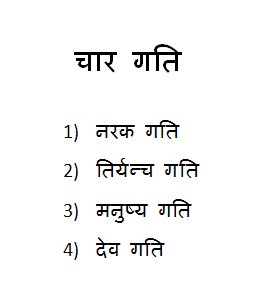
Note: tiryanch gati is the animal gati, i.e. the souls of all animals are in tiryanch gati.
So every soul takes the form of one or other gati. We presently are in ‘manushya gati’ but who knows, in future, we may take birth as a snake or land up in ‘narak’. Yes! Hell and heavens exist, and not only that, there are 12 heavens and 7 hells. The one who does evil deeds, or houses evil feelings towards anyone goes to hell (7th being the worst) and vice-versa(12th being the best). So, to stop our soul from suffering, it has to go to ‘moksha’; this is the ultimate destination of every souls, which causes rebirths to stop. So, keep ‘samta’, do good deeds and aim towards moksha. What one achieves in each life is of no consequence.
If you have any queries, please leave them as a comment to this post. Everything told above will be elaborated upon in the following posts.
Saturday, October 28
NAVAKAR MANTRA
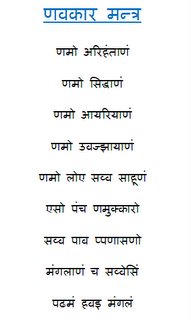
Namo Arihantanam
I bow in veneration to Arihantas (the destroyers of our inner enemies viz., Karmas).
Namo Siddhanam
I bow in veneration to Siddhas. (The souls that are perfect through the destruction of the Karmas.)
Namo Ayariyanam
I bow in veneration to Acharyas (The Head Sadhus of the four- fold Jain Sangh).
Namo Uvajjhayanam
I bow in veneration to Upadhyayas (The learned Sadhus who illustrate the Scriptures).
Namo loye savva sahunam
I bow in veneration to all Sadhus in the world. (Those who are pursuing the path of Moksha or salvation.)
Eso pancha namukkaro
Savva pävappanäsano
Mangalänam cha savvesim
Padhamam havai mangalam
This five-fold salutation destroys all sins and is the most auspicious one amongst all auspicious things.
Hereby, I appeal my readers to kindly try n learn this lil mantra, and believe me if you just say it once a day, your life will change for good. And if you wish, you will notice the change yourself. If you are kind enough to read my next posts, you will see why is it so necessary. Please follow my advice.